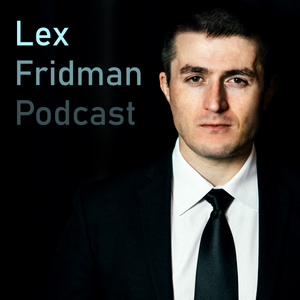
ADPD 2023 Conference Highlights - Part 2
04/10/23 • 50 min
2 Listeners
Previous Episode

Rebooting the Brain: Life & Research after a Stroke
Welcome to this episode of our podcast co-hosted by researchers Dr Gaia Brezzo and Mila Redzic, they our special guests sharing their inspiring story of resilience and hope. Today, we are joined by Denis and his daughter Maise, they became connected to Gaia and Mila after Denis experienced a life-altering event - a stroke. Together they share their personal journey of what it was like to have a stroke, the impact on the family, the challenges they faced during their recovery, and how they adapted to their new normal. They will also be sharing their journey of becoming involved in stroke research, the importance of research in stroke recovery, and how it has impacted their life. Through their story, we hope to shed light on the impact of stroke and the importance of research in advancing stroke care, its connections to dementia and the importance of improving the quality of life for stroke survivors. Please join us in welcoming our guest as they share their unique and inspiring journey. -- If you’re interested in participating in a research study, and based in the UK, Join Dementia Research supports people of all ages, both with an without dementia to be matched with appropriate studies. Registration is free, and you can even register on behalf of someone who is unable to do so themselves. Visit https://www.joindementiaresearch.nihr.ac.uk if you live outside the UK, there may be a similar service in your region e.g. Trial Match in the USA, and Stepup For Dementia Research in Australia. -- Our hosts this week are: Dr Gaia Brezzo, Research Fellow in Cerebral Vascular Disease and Dementia at the UK Dementia Research Institute at The University of Edinburgh. Gaia’s research focuses on understanding how immune alterations triggered by stroke shape chronic maladaptive neuroimmune responses that lead to post-stroke cognitive decline and vascular dementia. Mila Redzic, PhD Student at The University of Edinburgh. Mila is interested in understanding how microglial responses may shape changes occurring in the neurovascular unit in this context, and whether we can manipulate microglia to promote brain resilience and reduce cognitive impairment. -- Full biographies on the hosts and our guests, and a transcript can be found on our website https://www.dementiaresearcher.nihr.ac.uk -- Stroke is a serious medical condition that occurs when blood flow to the brain is interrupted, which can lead to brain damage. This damage can result in a range of cognitive problems, including dementia. Studies have shown that people who have had a stroke are at a higher risk of developing various forms of dementia, such as vascular dementia and Alzheimer's disease. The risk of dementia is particularly high in individuals who have had a stroke that affects a large part of the brain or who have had multiple strokes. In addition, many of the risk factors that increase the likelihood of having a stroke, such as high blood pressure, diabetes, and heart disease, also increase the risk of developing dementia. It's important to note that not everyone who has a stroke will develop dementia, and there are steps you can take to reduce your risk. Managing risk factors for stroke, such as maintaining a healthy diet and exercise routine, quitting smoking, and controlling blood pressure and cholesterol levels, can also help reduce the risk of dementia. -- Like what you hear? Please review, like, and share our podcast - and don't forget to subscribe to ensure you never miss an episode – and if you prefer to watch rather than listen, you’ll find a video version of this podcast with full captions on our YouTube Channel – http://www.youtube.com/dementiaresearcher -- This podcast is brought to you by University College London / UCLH NIHR Biomedical Research Centre in association with Alzheimer’s Association, Alzheimer's Research UK, Alzheimer's Society and Race Against Dementia who we thank for their ongoing support.
Next Episode

Things You Need To Know About Setting Up A Lab
Consider this podcast as a ‘Lab Setup 101”, we’ve brought together three newly minted principle investigators to talk about the highs, lows and practical things you need to consider when setting up a new lab – learning from their first-hand experience. Dr Fiona McLean, ARUK Fellow from University of Dundee talks with Dr Claire Durrant, RAD Fellow from The University of Edinburgh, Dr Ian Harrison, Senior Research Fellow from University College London and Dr Dayne Beccano-Kelly, Group Leader in the UK Dementia Research Institute at Cardiff University. Together our guests will guide you through the important things you need to know before embarking on this journey. Everything from locations and space to purchasing equipment, and hiring staff, we'll cover everything you need to get started. Our expert guests will also share their experiences and provide valuable insights to help you avoid common pitfalls and ensure a successful lab setup. So, join us as we explore the essentials of setting up your own lab. -- Meet the guests: Dr Fiona McLean is an Alzheimer's Research UK Fellow at University of Dundee. She is fascinated by the brain and has always been curious about how it works and what keeps it healthy. Her research focuses on the links between obesity, diabetes and neurodegenerative diseases. Dr Claire Durrant is a Race Aganinst Dementia / Dyson Foundation Fellow in the UK Dementia Research Institute at The University of Edinburgh. Her work focuses on understanding the causes and consequences of synapse loss in dementia causing disease such as Alzheimer’s disease. She is currently developing living human brain slices as a translational research tool. Dr Ian Harrison is a Senior Research Fellow at University College London. His work looks at the function of the glymphatic system in the brain, responsible for the clearance of protein solutes from the brain parenchyma. Dr Dayne Beccano-Kelly is UKRI Future Leader Fellow and UK Dementia Research Institute Group Leader at Cardiff University. He is working on neurodegeneration focussing on Parkinson’s disease and looking at both the temporality of the disorder as well as the role synaptic dysfunction plays. -- Like what you hear? Please review, like, and share our podcast - and don't forget to subscribe to ensure you never miss an episode – and if you prefer to watch rather than listen, you’ll find a video version of this podcast with full captions on our YouTube Channel – www.youtube.com/dementiaresearcher -- This podcast is brought to you by University College London / UCLH NIHR Biomedical Research Centre in association with Alzheimer’s Association, Alzheimer's Research UK, Alzheimer's Society and Race Against Dementia who we thank for their ongoing support.
If you like this episode you’ll love
Episode Comments
Featured in these lists



Generate a badge
Get a badge for your website that links back to this episode
<a href="https://goodpods.com/podcasts/dementia-researcher-152321/adpd-2023-conference-highlights-part-2-29205525"> <img src="https://storage.googleapis.com/goodpods-images-bucket/badges/generic-badge-1.svg" alt="listen to adpd 2023 conference highlights - part 2 on goodpods" style="width: 225px" /> </a>
Copy




